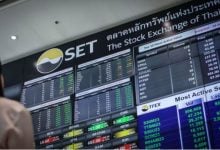TBA urges integration of informal economy for digital growth

The Thai Bankers’ Association (TBA) has advocated for integrating the informal economy into the national economic framework to enhance transparency and bolster the country’s digital economy.
The recovery index of Thailand’s GDP post-pandemic in 2023 was marked at 110, underperforming the worldwide average of 80, according to the TBA. A higher score on this index indicates a lengthier recovery period.
The TBA also pointed out that Thailand’s rebound has been more sluggish than its neighbours in the region, and the economic forecast continues to be fraught with uncertainty.
Payong Srivanich, the chairman of the TBA and president of Krungthai Bank (KTB), attributed this gradual recovery partly to the informal economy, which constitutes a substantial chunk of the nation’s GDP. He made these remarks at a seminar the previous week.
Thailand’s informal economy is believed to make up 48.4% of the GDP, outstripping other regional counterparts such as the Philippines at 39.8%, Malaysia at 30.5%, South Korea at 26%, Singapore at 17.9%, and Vietnam at 14.4%, reported Bangkok Post.
The total number of Thais in the tax system is approximately 10-11 million, with around 4 million of them paying taxes, out of a population of about 66 million.
The TBA highlighted that informal labour comprises 51% of the total labour force, and the volume of informal debt is assumed to be substantial.
As per the National Economic and Social Development Council, informal debt in Thailand stood at around 1.35 trillion baht (US$37 billion) in 2023. However, the Thai Chamber of Commerce reported that informal debt was about 3.97 trillion baht (US$109 billion) last year, as stated by Payong.
“Thailand also faces swelling of household debt, while both the informal economy and informal debt would escalate the problem.”
Data from the Bank of Thailand showed that the ratio of household debt to GDP in Thailand was 90.9% in the third quarter of 2023.
If informal debt is taken into account in the nation’s household debt, the overall household debt is likely to exceed the current level.
Promoting a data-driven economy
Payong pointed out that in Thailand, small and medium-sized enterprises within the corporate tax system account for 26% of total registered companies.
He called for the promotion of a data-driven economy in Thailand to boost transparency, productivity, and economic potential.
Furthermore, he suggested that a higher economic potential would continue to supplant the informal economy, thereby ensuring the country’s long-term economic growth.
The economy’s recovery has been uneven, with wealth disparity widening as the rich grow richer while the poverty become poorer.
Consequently, the government has prioritised the necessity to stimulate the economy, which is yet to fully rebound, through additional stimulus to spur growth, alleviate household debt, and enhance living conditions.
Interest rates on existing loans are expected to be high for the vulnerable segments, said Payong.
“Banks are ready to take care of the vulnerable segments under targeted measures, while interest rates should be in line with market mechanisms.”
Latest Thailand News
Follow The Thaiger on Google News:


























